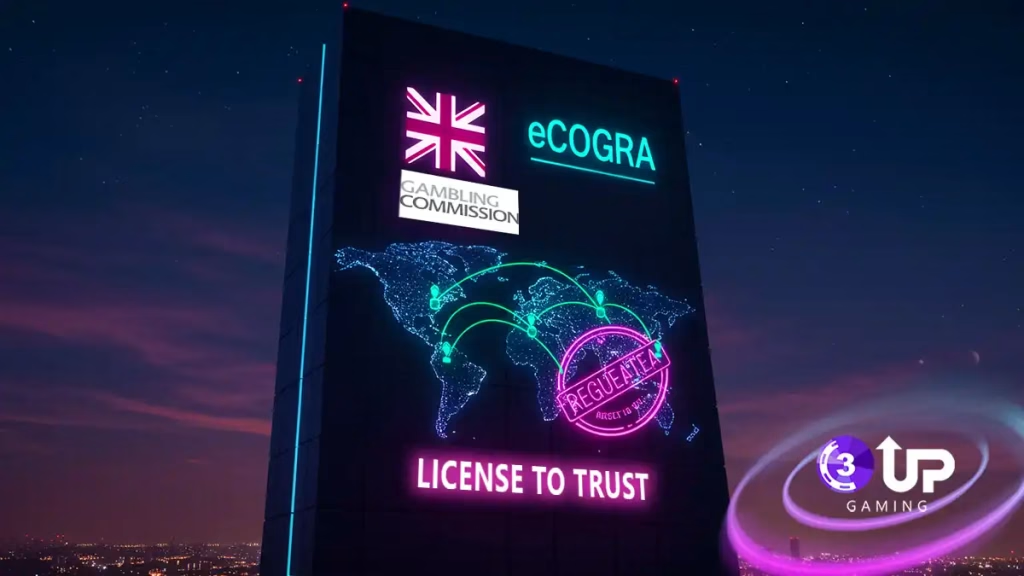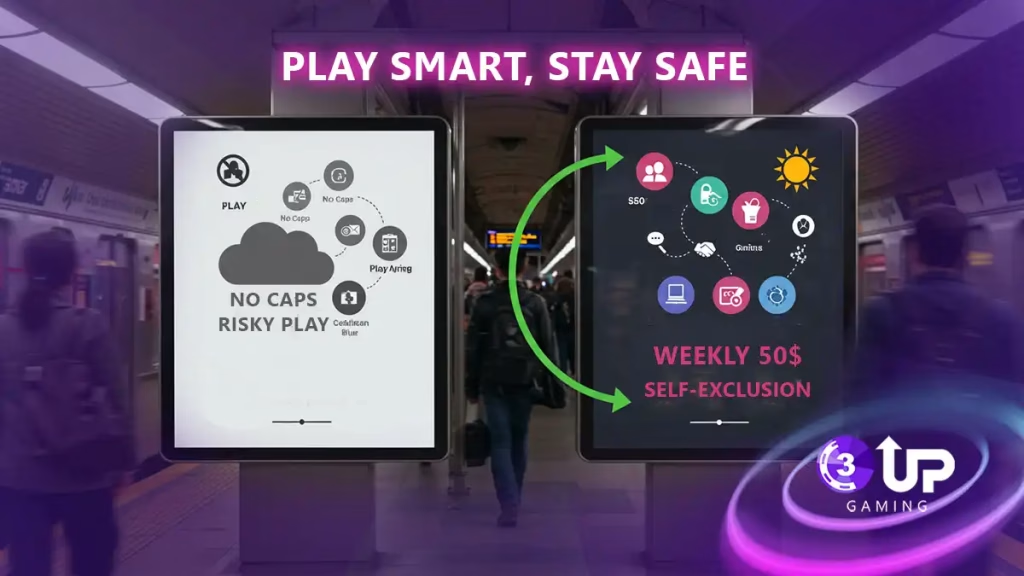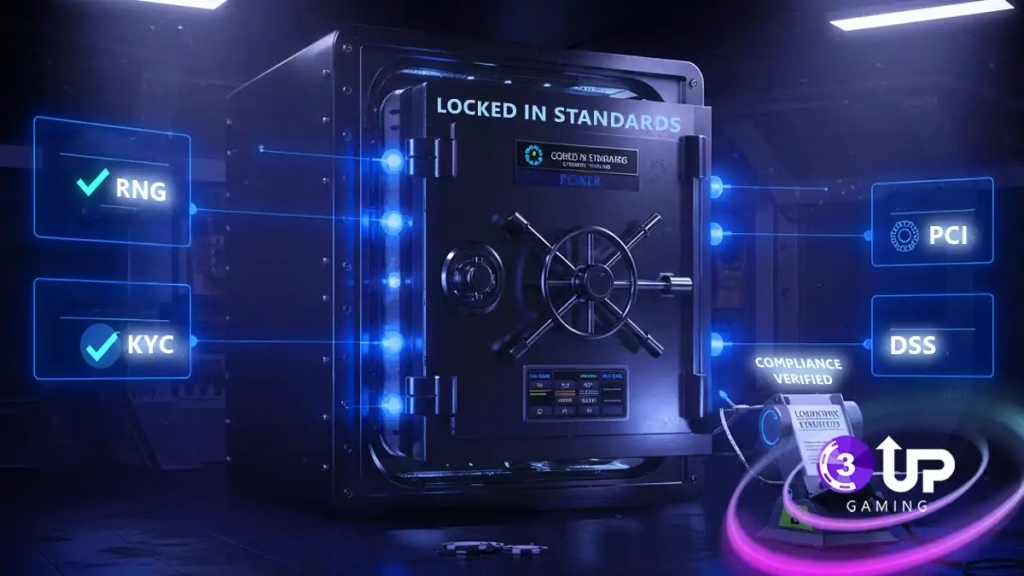Online Poker Software Compliance Standards Explained! Ever fold a hand and swear the site’s cheating? I did, losing $200 to a “glitch,” sparking my obsession with poker compliance standards. These rules keep games fair, bets safe. Curious how? Join my messy journey through poker’s hidden safeguards, from audits to encryption.
Wonder how poker sites stay honest? I dug into compliance standards after a bad beat, revealing how they protect your bets and data.
Online Poker Software Compliance Standards
In the fast-evolving world of online poker, software compliance standards play a crucial role in ensuring fairness, security, and integrity across platforms. These standards are set by regulatory authorities and independent testing labs such as eCOGRA, GLI (Gaming Laboratories International), and iTech Labs. They evaluate whether poker software operates transparently, uses certified Random Number Generators (RNGs), and protects user data through encryption and secure protocols. Compliance also includes features like anti-collusion systems, fraud detection tools, and responsible gaming settings to ensure a safe experience for all players.
For operators, meeting these standards is not optional, it’s a legal and ethical requirement to obtain licenses in regulated jurisdictions like the UK, Malta, or several U.S. states. Platforms that fail to comply risk heavy fines, license suspension, or complete shutdown. From a player’s perspective, choosing an online poker site that adheres to these compliance standards means they can trust the platform to provide a level playing field. In short, software compliance isn’t just about ticking boxes, it’s about protecting the game, the players, and the reputation of the industry as a whole.
What Are Compliance Standards in Online Poker Software?

A platform once ate my $200 pot, claiming a system error. That’s when I stumbled on poker compliance standards, rules from the Malta Gaming Authority ensuring platforms like Texas Hold’em deal straight and keep my money safe from disappearing.
At first, I thought it was just legal mumbo-jumbo. But these rules are why I can bluff without sweating scams. If you’re new to poker, check a site’s compliance, it’s like peeking at the dealer’s cards before betting big.
Why Compliance Matters for Operators and Players Alike
Running a poker site showed me one slip can ruin you. A platform got crushed with a huge fine in 2024 for flimsy security, bleeding players. Compliance keeps operators legit and lets me trust my chips won’t vanish mid-game.
I used to chase sketchy bonuses, but now I see compliance as my shield. It’s the line between a fair flop and a rip-off. Whether you’re playing or building a site, these rules are your best friend.
Key Regulatory Bodies for Poker Software Licensing
A dodgy site once had me doubting every deal, like the deck was marked. Then I learned about regulators like the UK Gambling Commission, who crack down to keep poker honest, like bouncers kicking out cheaters.
Now I always scope out a site’s license. Hundreds of platforms got regulated recently, proof it’s serious. Before you join a table, spot a regulator’s badge, it’s a quick trick to play safe.
Fair Play Protocols and RNG (Random Number Generator) Certification
I used to think online poker was a rigged slot machine. Then a site certified by eCOGRA proved every card’s random, like a real shuffle. RNG audits stop platforms from sneaking in bad deals, keeping my hands fair.
A site got burned for fudging cards a while back, and I’m not risking that. I only play where audits are clear. Want a fair game? Make sure the platform’s RNG is vetted, it’s a dealbreaker.
Why Audits Are My Poker Lifeline
Audits catch tricks before they screw players. Knowing labs test every deal feels like having a pit boss watching. If a site’s open about its RNG checks, I’m more likely to bet big.
Read More: Advanced AI Poker Bot
How RNG Stops the Cheats
RNG certification means my Omaha hands aren’t fixed. I once read an audit report and felt like I’d cracked a code. Platforms that show their fairness get my trust, no question.
Data Protection and Player Privacy Requirements
One night, a login glitch made me think hackers got my data, heart racing. Privacy rules like SSL encryption guard my emails and card info, so I can chase a flush without worrying about digital thieves.
I always check for that browser padlock now. A site paid big for leaky security recently. Before you sign up, make sure the platform’s privacy is ironclad, it’s not worth the gamble.
Anti-Money Laundering (AML) and Know Your Customer (KYC) Policies

Uploading my ID felt like they thought I was a crook. But KYC and AML rules keep fraudsters out, making my tables legit. Now I get it, these checks are what keep poker clean.
I used to grumble about KYC until a site got fined for skipping it. If you’re picking a platform, go for ones that verify players, it’s like a velvet rope for honest games.
Responsible Gaming Features Required by Law
Chasing losses once left me broke at 3 a.m., cursing my stupidity. Tools like spending caps, required by law, stopped me from spiraling, keeping poker a thrill, not a trap. They’re my guardrails now.
A $50 weekly cap keeps my bets sane, like a friend saying “enough.” Platforms with these tools care about players. Start with limits, it’s a lesson I learned after too many bad nights.
How Caps Saved My Wallet
Weekly limits are like a timeout when I’m tilting. They’ve kept me from betting my rent. Platforms pushing responsible gaming feel like they’ve got my back, not just my cash.
Why Pausing Was My Best Move
Self-exclusion let me step away for a month, clearing my head. It’s mandatory now, and it works. If a site offers this, they’re serious about keeping poker fun, not frantic.
Payment System Compliance: PCI-DSS and Secure Transactions
I dropped $100 on a site last week, no stress, because payment rules like PCI-DSS encrypt my card details. I don’t worry about withdrawals vanishing or my money getting stuck in limbo.
A site got slammed for weak payments recently, losing trust. That’s why I check security first. When you deposit, make sure the platform’s payment setup is locked tight, it’s your money.
| Payment Feature | Dodgy Sites | Trustworthy Sites |
| Encryption | Weak, risky | Full, PCI-DSS |
| Transaction Speed | Slow, glitchy | Quick, reliable |
| Security Checks | Spotty, lax | Regular, strict |
Caption: Why I only deposit on secure poker platforms.
ALT: Poker payment security comparison table showing PCI-DSS standards.
I used to deposit anywhere, but after a withdrawal got “lost,” I learned my lesson. This table shows why secure sites save you headaches, trust me, I’ve been burned.
How to Ensure Your Poker Platform Meets Global Standards
Building my poker site was like betting blind, scary but exciting. Licensing and audits brought players who trusted my tables. Global standards aren’t just rules, they’re how you prove you’re the real deal.
I started with vetted software and fraud checks. An audit once caught a bug, saving my skin. If you’re launching a platform, get compliance right from the start, it’s your foundation.
Common Pitfalls That Lead to Non-Compliance and How to Avoid Them
I nearly killed my site by missing a local law, a rookie mistake. Weak security or skipped checks can lead to bans. Compliance keeps your platform alive and players coming back for more.
A site got fined big for loose encryption not long ago. I avoided that by tightening my setup. If you’re running a platform, triple-check every rule, it’s cheaper than a shutdown.
Security Mistakes That Haunt
Leaky encryption can tank a site, like one I saw crash recently. I use airtight security and audits to stay safe. Test your platform early, players won’t forgive sloppiness.
Local Laws You Can’t Skip
Ignoring regional rules got a platform banned fast. I lean on experts to stay compliant. Know your local laws, it’s like memorizing poker odds, miss them and you’re out.
Why Web3 Poker Feels Like a New Deal
A Web3 poker game had me hooked, every bet crystal clear on blockchain. It matches poker compliance standards with open records, but new rules are a maze. This could be poker’s future.
I love Web3’s honesty, like playing with glass cards. A site got fined for weak checks, though. If you’re trying Web3, pick platforms with solid compliance, it’s still wild out there.
How Geolocation Keeps Poker Above Board
Geolocation once blocked my bet in a restricted zone, like a slap. It enforces poker compliance standards, keeping games legal and platforms out of hot water with regulators.
Sites using geolocation avoid fines by playing by local rules. One platform didn’t and paid dearly. Make sure your site has this, it’s a must for staying legit.
Why Age Checks Are More Than a Formality

Verifying my age seemed pointless, just another hoop. But age checks stop kids from gambling, keeping poker legal. Platforms that skip them face fines and lose player trust fast.
A site got nailed for lax age verification recently. I only play where they’re strict. Check if a platform enforces this, it’s a sign they’re serious about the rules.
How Tax Rules Shape Poker Platforms
Taxes for my poker site hit like a bad beat, unexpected and painful. Tax compliance, part of poker compliance standards, ensures legal earnings reporting, saving you from costly penalties.
A platform got burned for dodging taxes a while back. Automating reports keeps me straight. If you’re an operator, tackle taxes early, it’s less stress than fighting regulators.
Why Support Teams Make or Break Trust
A support team once saved my account when a glitch locked me out, like heroes. Good support, required by compliance, shows a platform’s legit, not just chasing your deposits.
Poor support cost site players and a fine recently. I stick to platforms with fast help. Test a site’s support before you play, it’s a peek at their true colors.
| Compliance Area | Risky Platforms | Reliable Platforms |
| Fairness Audits | Unchecked, shady | Audited, honest |
| Data Security | Leaky, exposed | Encrypted, safe |
| Player Checks | Loose, risky | Strict, secure |
After losing a pot to a shady site, this table became my cheat sheet. It’s why I only trust platforms that check every box, no shortcuts.
Conclusion: Poker Compliance Is My Secret Weapon
Poker compliance standards turned me from a paranoid player into a confident one, burned by bad sites but wiser now. Audits, encryption, and rules keep poker fair, your bets safe. Play smart, pick compliant platforms, it’s the edge I earned through too many bad beats.
FAQ
1. What does poker software compliance mean?
It’s the rules making poker sites fair and safe, like audits for honest deals and data protection. I check these to dodge scams, it’s like knowing the table’s clean before sitting down.
2. Is it mandatory to follow compliance standards for an online poker site?
Yeah, skipping them can sink a platform. A site got fined huge for ignoring rules recently. Compliance keeps my games legit and my money secure, no debate.
3. Which jurisdictions have the strictest poker software regulations?
Places like Malta and the UK demand tight oversight, no slacking. I trust their platforms. Look at a site’s license region to know it’s not cutting corners.
4. What is RNG certification and why is it important?
It proves cards are dealt randomly, no rigging. Audited sites pass these tests. I won’t play without it, it’s my guarantee the game’s straight-up fair.
5. How do I know if a poker platform is fully licensed?
Spot a regulator’s badge in the footer. I always check this to avoid traps. It’s a fast way to make sure you’re not playing on a sketchy site.
6. What kind of player data protection is required?
Encryption and secure storage are non-negotiable to protect your info. A site got hit for weak security recently. I only trust platforms with top-notch safeguards.
7. Can I launch a poker app without KYC processes?
No chance, KYC stops fraud and is required. A platform got busted for skipping it. If you’re launching an app, make verification a priority, it’s the law.
8. Are there global compliance standards or do they vary by region?
They vary, some focus on safety, others on finances. Check a site’s region to get its rules. I’d do this to know what kind of protection I’m getting.


